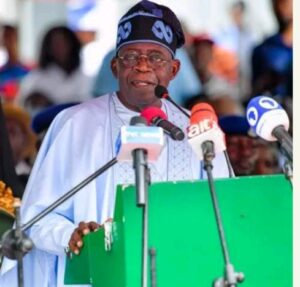How Tinubu Vows to Address Nigeria’s Economic Challenges Through Agriculture
How Tinubu Vows to Address Nigeria’s Economic Challenges Through Agriculture

Bola Ahmed Tinubu
President Bola Tinubu reaffirmed his commitment to tackling Nigeria’s complex economic issues, emphasizing that solutions would largely stem from agriculture, a key sector for diversifying the nation’s oil-dependent economy.
Speaking at the 12th convocation ceremony of the Michael Okpara University of Agriculture in Umuahia on Saturday, Tinubu highlighted the importance of agriculture in his administration’s strategy for economic transformation.
Represented by Dr. Deola Lordbanjou, Director of Extension at the Federal Ministry of Agriculture and Food Security, the president acknowledged that Nigeria faces deep-rooted challenges, but expressed confidence in overcoming them. He emphasized that agriculture remains central to reducing the country’s reliance on oil and achieving food security.
“To address the nation’s diverse challenges, we must turn to agriculture, a vital sector for economic diversification,” Tinubu remarked. “We need the expertise of agricultural scientists and professionals to help eliminate hunger and make Nigeria self-sufficient in food production. This is why my administration has increased the number of agricultural universities across the country.”
Tinubu further praised the role of quality education in addressing the nation’s socio-economic and political challenges. He noted that his government has set up the National Education Loan Fund (NEL Fund) to help ease the financial burdens of students and their families.
In his address, the president also underlined the strategic importance of agricultural universities in boosting the nation’s food production and economic development. “We are counting on these institutions to drive innovation in agriculture, foster industrialization, and help achieve food security,” he said. “Given Nigeria’s diverse soil, climate, and crops, we have vast potential to transform our agricultural sector and reduce our dependence on imported food.”
The president also called on private organizations and individuals to collaborate with the government and universities to promote agricultural research and innovation. “We need partnerships to scale up research and achieve sustainable agricultural growth,” he added.
Tinubu acknowledged the socio-economic challenges his government inherited but reassured citizens that efforts were underway to tackle these issues. “We are committed to policies that address the root causes of our problems,” he stated. “While there are no quick fixes, the measures we are implementing will lead to positive change.”
On energy security, Tinubu explained that the full deregulation of the petroleum sector, though difficult initially, was essential for long-term energy stability and economic growth. He expressed confidence that competition in the sector would benefit consumers, particularly the poor.
The president also addressed the security situation, assuring Nigerians that the government is determined to eliminate insecurity. “Our security forces are actively confronting criminal elements, and we will not rest until peace is restored across the country,” he said.
In his speech, the Vice Chancellor of Michael Okpara University of Agriculture, Prof. Maduebibisi Ofo Iwe, outlined the university’s challenges, including insufficient funding, poor infrastructure, and staff shortages due to migration. Abia State Governor Alex Otti, represented by Deputy Governor Ikechukwu Emetu, pledged continued support for the university’s development.
The Pro-Chancellor, Comrade Fidelis Edeh, assured the university community of the Governing Council’s commitment to accountability and tangible results in its operations.
TRENDING SONGS
 Shock in Anambra: Bride Disappears Moments Before Wedding
Shock in Anambra: Bride Disappears Moments Before Wedding
 Nigerian Woman Returns ₦330 Million Accidentally Credited to Her Account
Nigerian Woman Returns ₦330 Million Accidentally Credited to Her Account
 APC Don Reach Morocco?’ VeryDarkMan Reacts to Seyi Tinubu Poster
APC Don Reach Morocco?’ VeryDarkMan Reacts to Seyi Tinubu Poster
 Bride Breaks Down in Tears as Wedding Meals Were Kept Secretly While Guests Go Home Hungry
Bride Breaks Down in Tears as Wedding Meals Were Kept Secretly While Guests Go Home Hungry
 Odogwu by Day, Robber by Night: How Marriage Joy Turned Into Tragedy
Odogwu by Day, Robber by Night: How Marriage Joy Turned Into Tragedy
 Nigerian Officials Allegedly Pocket N4–6B Weekly Through Smuggling Cartels at Seme–Badagry Border
Nigerian Officials Allegedly Pocket N4–6B Weekly Through Smuggling Cartels at Seme–Badagry Border
 Ahmad Yerima: Naval Officer to Face No Sanctions After Clash with Wike – Matawalle
Ahmad Yerima: Naval Officer to Face No Sanctions After Clash with Wike – Matawalle
 Trending Video: Muslim Man Joins Wife in Hallelujah Challenge ‘Dress Like Your Miracle’ Night
Trending Video: Muslim Man Joins Wife in Hallelujah Challenge ‘Dress Like Your Miracle’ Night
 Woman Seeks Advice as Late Brother’s Wife Refuses to Mourn Him Following His Death With Alleged Mistress
Woman Seeks Advice as Late Brother’s Wife Refuses to Mourn Him Following His Death With Alleged Mistress
 Nobody Cares About Fine Girls In The UK, I Miss Nigeria — Nigerian Lady Laments
Nobody Cares About Fine Girls In The UK, I Miss Nigeria — Nigerian Lady Laments
Share this post with your friends on ![]()













